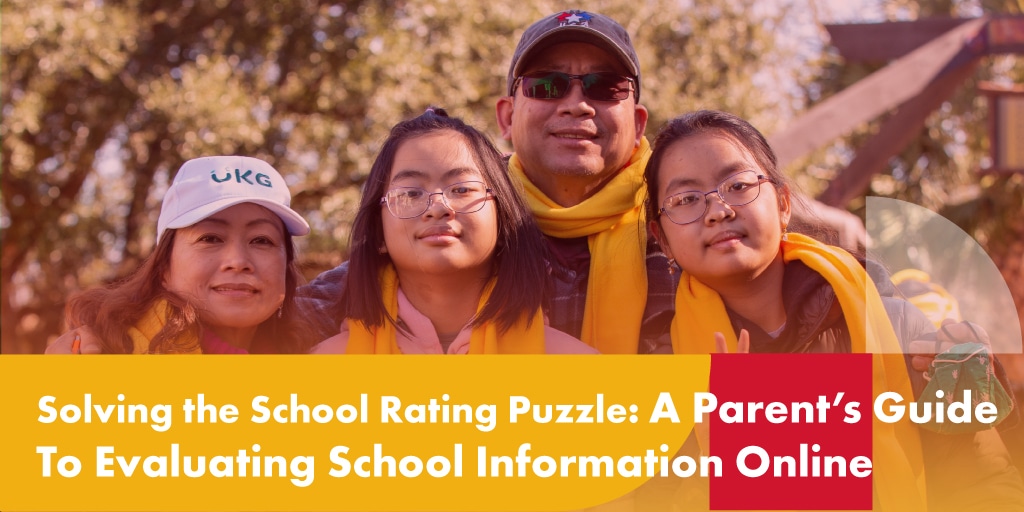Posted on Modified on Posted by National School Choice Week Team
Solving the School Rating Puzzle: A Parent’s Guide to Evaluating School Information Online

Choosing the right school for your child is an important decision, and the internet is a goldmine of information. However, sometimes, what can seem like a tool in your school decision process can also hinder your search. To guide you in making savvy choices about your child’s education, it’s essential to know how to navigate through the sea of school information online.
We’ll be your guide in evaluating school information that you find online. We’ll also help you break down and better understand school ratings and reviews and equip you to spot any warning signs that a school might not be the best fit for your child.
By following the steps in this guide, you’ll be ready to make the right decision about your child’s education. We understand it can feel like an overwhelming task, but with the right information, you will be ready to pick the perfect school for your child’s school journey, whether you choose a traditional public school, public charter school, public magnet school, private school, online learning, homeschooling, or microschooling and mix-and-match learning.
Explore Accreditation, Ratings, and Reviews
What is Accreditation?
One essential step to evaluating and deciphering school information is checking accreditation. This is a crucial step to consider when picking a school that is right for your child. Because a lot of schools go through a rigorous accreditation process, you can use it as a marker of commitment to meeting certain education standards. Accredited schools are periodically re-evaluated to ensure that they continue to meet the established standards.
By choosing an accredited school, you can:
- Verify teaching methods and faculty qualifications
- View offered student services
- Be confident that your child is receiving a quality education that upholds recognized educational benchmarks.
To verify a school’s accreditation status, you can visit the website of the accrediting agency or contact the school directly. It is important to note that accreditation is not the only factor to consider when selecting a school, but it is a significant indicator of a school’s commitment to providing a quality education to its students. Fewer than half of states require public schools to maintain accreditation.
Non-Public School Evaluation Resources
It’s important to note that accreditation and ratings work differently for private school and homeschooling options vs. public-sector schools. So, don’t be alarmed if there seems to be a lack of information in these categories. We often receive inquiries from families who are looking for accredited private or homeschooling options for their children. It’s important to note that accreditation is typically handled by private agencies, so there is no one-size-fits-all standard that parents should be aware of. Rather, accreditation should be viewed as a means to an end. For most families, their primary concern is ensuring that their child can demonstrate completion of high school and receive a high-quality education that will prepare them for college or employment opportunities.
Colleges and employers are used to evaluating students who have graduated from private or homeschooling options, and almost always are prepared to accept a non-public diploma provided it conforms to the private or homeschooling guidance in their state.
Finding evaluation information for non-public schools can be a bit challenging, as they are not as standardized as public schools. However, there are several resources and strategies you can utilize to gather valuable insights. For non-public school options it’s best to contact and consult educational associations that focus on non-public schools like the Council of American Private Education (CAPE) or the Home School Legal Defense Association (HSLDA) Both associations provide other rating and evaluation resources that you can use to gain valuable insight.
Ratings and Reviews
In the digital age, parents have an abundance of information right at their fingertips to help in the important decision of choosing the right school for their child. Websites like Niche, Great Schools, and state school rankings are valuable websites and tools that provide useful insight into the educational landscape, but while these websites may be great first steps, they should only serve as helpful tools/resources for evaluating school information.
Read Between the Lines
When it comes to interpreting school ratings and reviews, it’s crucial to take a thorough approach. Although it may make sense to choose a school based on overall test scores, it’s important to note that such ratings aren’t always accurate markers of a school’s success. Instead of solely relying on scores, it’s important to delve deeper and read the reviews carefully, keeping in mind the context of the review and the source of the information.
Before making any decisions, consider
- Who wrote the review? If a review is written by a parent who has only had one child attend the school, their perspective may be limited. Similarly, if a review is written by a student who only attended the school for a short period of time, their perspective may not be as comprehensive as that of a student who attended the school for several years.
- Specificity of the feedback. Reviews that provide detailed and specific feedback are more valuable than those that make vague statements without any supporting evidence. Specific feedback can highlight areas where the school is excelling, as well as areas where it may need improvement.
- The tone of the reviews. Reviews that are overly negative or positive may not provide a well-rounded and accurate picture of the school. Instead, look for reviews that provide a balanced and thoughtful evaluation of the school.
Warning Signs to Look Out For
While positive reviews should always be noted, potential warning signs should also be monitored. One way to do this is to pay attention to recurring complaints or common issues that multiple reviewers bring up.
For instance, if you notice that reviewers are consistently dissatisfied with the school’s management style or if you see a trend of teacher turnover, then these could be warning signs that something is amiss. Similarly, if you see that reviewers are frequently complaining about a lack of communication from the school or its staff, then this could also be a cause for concern.
Ultimately, it’s important to trust your instincts and investigate further if you feel that something is not quite right. By doing so, you can help ensure that you make the most informed decisions possible when it comes to your child’s education.
Don’t Underestimate Social Media and Website Presence
To make an informed decision, you need to explore the school’s official website, study its social media presence, study other sources, and take advantage of any virtual tours offered. These resources provide valuable information about the school’s facilities, staff, faculty, curriculum, extracurricular activities, and overall environment.
- When you visit the school’s website, you can find detailed information about its academic programs, admission requirements, school policies, and other essential aspects. You can also read about the school’s mission, vision, and values to gain insight into its culture and approach to education.
- Use other sources to look up additional information. Look at any recent news involving the school to get a better sense of what their values are. Look at headlines, and search for anything interesting or concerning that might aid in your search
- Check their social media accounts. Social media accounts can also be a valuable source of information about the school’s activities, events, and achievements. You can check the school’s Facebook, Twitter, or Instagram pages to see how it engages with its students and the community. You can also read comments, reviews, and feedback from current and former students, parents, and teachers.
- Take a virtual tour of the school. Virtual tours are an excellent way to experience the school’s facilities and environment without physically being there. You can explore the campus, classrooms, labs, libraries, sports facilities, and other areas to see if they meet your expectations and needs.
For more information on school tours, check out our video for helpful questions to ask during school tours.

Additional Tips
When navigating school information online, it may be easy to get lost on your journey.
Asking questions during your search is a great way to make sure that you are staying on track and not overwhelming yourself.
Some helpful questions to ask during your search may include questions like:
- What is the school’s mission?
- What is the school’s environment like?
- What is the student-to-teacher ratio?
- Do I have to apply to the school? If so, what is the process?
- What types of learning styles are provided?
Ensure that you are up-to-date on all policies and procedures of each school you find. It’s also good to ensure that each school you research has updated policies and procedures available for you to view.
Find out if teachers provide one-on-one learning opportunities or tutoring for students.
Choosing a school is a journey, not a destination. By doing your homework on insights from trustworthy websites, thorough personal research, and consideration of individual needs, you can piece together the puzzle and confidently make a well-educated decision about your child’s education. Remember, each child is unique, and the right school will be key to their individual growth and success.
